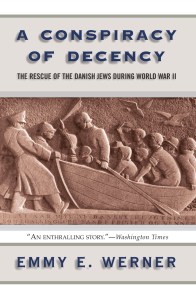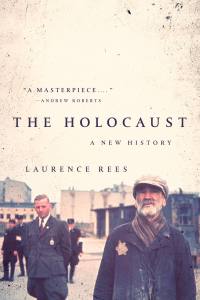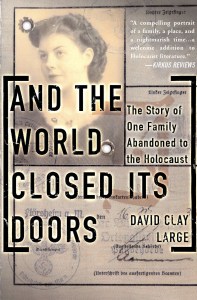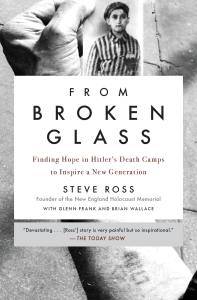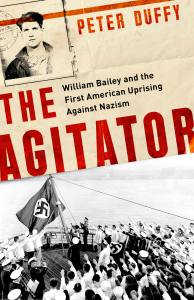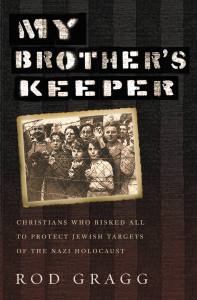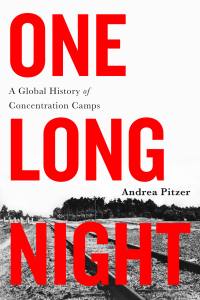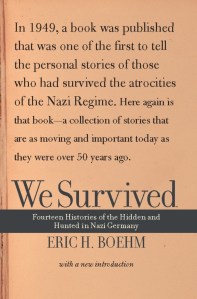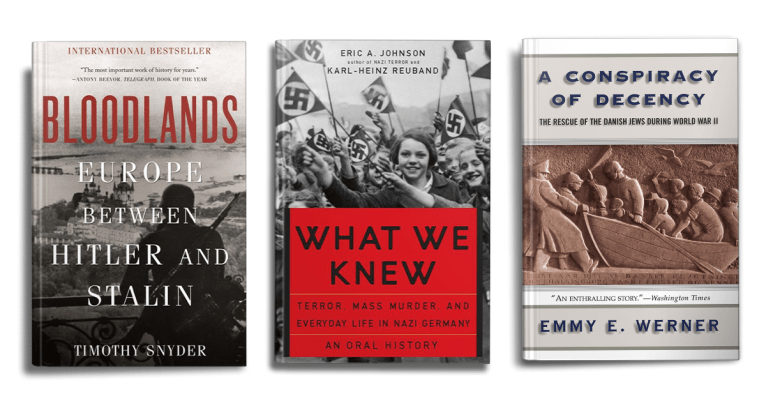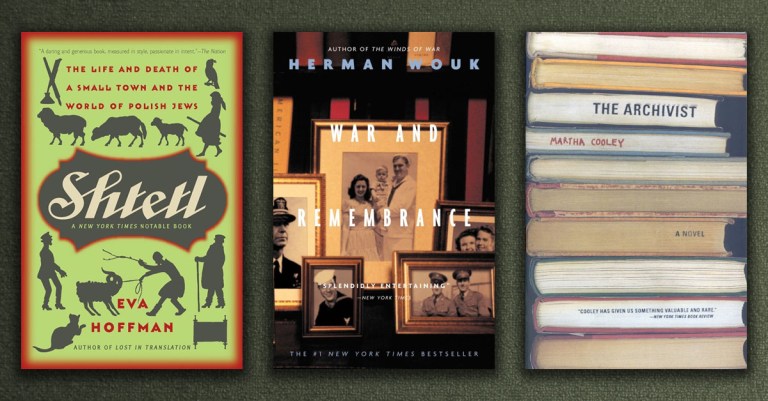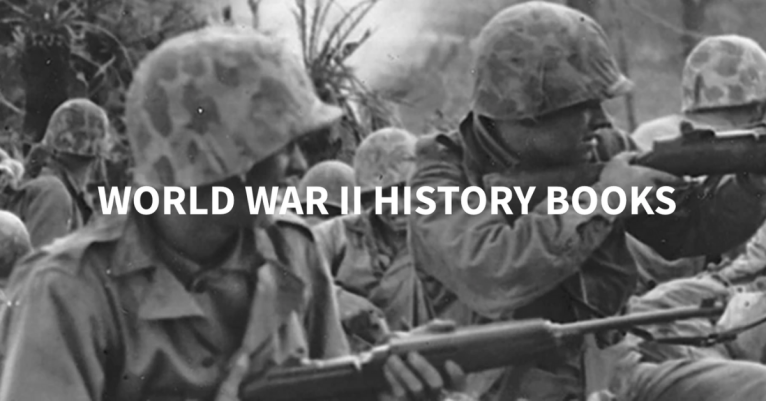Books for Holocaust Remembrance Day
Take time to remember and honor the lives and memories of the victims of the Holocaust with these important books.
Zippi Spitzer and David Wisnia were captivated by each other from the moment they first exchanged glances across the work floor. It was the beginning of a love story that could have happened anywhere. Except for one difference: this romance was unfolding in history’s most notorious death camp, between two young prisoners whose budding intimacy risked dooming them if they were caught.
Incredibly, David and Zippi survived for years beneath the ash-choked skies of Auschwitz. Under the protection of their fellow inmates, their romance grew and deepened, even as their brushes with death mounted and David’s luck in particular seemed close to running out. As the war’s end finally approached and the time came for them to leave the camp, David and Zippi made plans to meet again. But neither of them could imagine how long their reunion would take or how many lives they would live in the interim. They had no inkling, either, of the betrayals that would await them along the way. But David did suspect that Zippi harbored a secret—one that could explain the mystery of his survival all those years ago.
An unbelievable tale of romance, sacrifice, loss, and resilience, Lovers in Auschwitz is a saga of two young people who found themselves trapped inside a waking nightmare of the Nazis’ creation, yet who nevertheless discovered a love that sustained them through history’s darkest hour.
The largest mass murder in human history took place in World War II at Auschwitz. Yet its story is not fully known. In Auschwitz, Laurence Rees reveals new insights from more than 100 original interviews with survivors and Nazi perpetrators who speak on the record for the first time. Their testimonies provide a portrait of the inner workings of the camp in unrivalled detail-from the techniques of mass murder, to the politics and gossip mill that turned between guards and prisoners, to the on-camp brothel in which the lines between those guards and prisoners became surprisingly blurred.
Rees examines the strategic decisions that led the Hitler and Himmler to make Auschwitz the primary site for the extinction of Europe's Jews-their "Final Solution." He concludes that many of the horrors that were perpetrated in Auschwitz were the result of a terrible immoral pragmatism. The story of the camp becomes a morality tale, too, in which evil is shown to proceed in a series of deft, almost noiseless incremental steps until it produces the overwhelming horror of the industrial scale slaughter that was inflicted in the gas chambers of Auschwitz.
Laurence Rees has spent twenty-five years meeting survivors and perpetrators of the Holocaust. Now, he combines their never-before-seen eyewitness testimony with the latest academic research to create a uniquely accessible and authoritative account of the Holocaust.
In The Holocaust, Rees offers an examination of the decision-making process of the Nazi state, and in the process reveals the series of escalations that cumulatively created the horror. He argues that while hatred of the Jews was always at the epicenter of Nazi thinking, what happened cannot be fully understood without considering the murder of the Jews alongside plans to kill large numbers of non-Jews, including the disabled, Sinti, and Roma, plus millions of Soviet civilians.
Through a chronological, intensely readable narrative, featuring enthralling eyewitness testimony and the latest academic research, this is a compelling new account of the worst crime in history.
On August 14, 2017, two days after a white-supremacist activist rammed his car into a group of anti-Fascist protestors, killing one and injuring nineteen, the New England Holocaust Memorial was vandalized for the second time in as many months. At the base of one of its fifty-four-foot glass towers lay a pile of shards. For Steve Ross, the image called to mind Kristallnacht, the Night of Broken Glass in which German authorities ransacked Jewish-owned buildings with sledgehammers.
Ross was eight years old when the Nazis invaded his Polish village, forcing his family to flee. He spent his next six years in a day-to-day struggle to survive the notorious camps in which he was imprisoned, Auschwitz-Birkenau and Dachau among them. When he was finally liberated, he no longer knew how old he was, he was literally starving to death, and everyone in his family except for his brother had been killed.
Ross learned in his darkest experiences–by observing and enduring inconceivable cruelty as well as by receiving compassion from caring fellow prisoners–the human capacity to rise above even the bleakest circumstances. He decided to devote himself to underprivileged youth, aiming to ensure that despite the obstacles in their lives they would never experience suffering like he had. Over the course of a nearly forty-year career as a psychologist working in the Boston city schools, that was exactly what he did. At the end of his career, he spearheaded the creation of the New England Holocaust Memorial, a site millions of people including young students visit every year.
Equal parts heartrending, brutal, and inspiring, From Broken Glass is the story of how one man survived the unimaginable and helped lead a new generation to forge a more compassionate world.
By 1935, Hitler had suppressed all internal opposition and established himself as Germany’s unchallenged dictator. Yet many Americans remained largely indifferent as he turned his dangerous ambitions abroad. Not William Bailey.
Just days after violent anti-Semitic riots had broken out in Berlin, the SS Bremen, the flagship of Hitler’s commercial armada, was welcomed into New York Harbor. Bailey led a small group that slipped past security and cut down the Nazi flag from the boat in the middle of a lavish party. A brawl ensued, followed by a media circus and a trial, in which Bailey and his team were stunningly acquitted. The political victory ultimately exposed Hitler’s narcissism and violent aggression for all of America to see.
The Agitator is the captivating story of Bailey’s courage and vision in the Bremen incident, the pinnacle of a life spent battling against fascism. Bailey’s story is full of drama and heart–and it’s an inspiration to anyone who seeks to resist tyranny.
Thirty captivating profiles of Christians who risked everything to rescue their Jewish neighbors from Nazi terror during the Holocaust.
My Brother’s Keeper unfolds powerful stories of Christians from across denominations who gave everything they had to save the Jewish people from the evils of the Holocaust. This unlikely group of believers, later honored by the nation of Israel as “The Righteous Among the Nations,” includes ordinary teenage girls, pastors, priests, a German army officer, a former Italian fascist, an international spy, and even a princess.
In one gripping profile after another, these extraordinary historical accounts offer stories of steadfast believers who together helped thousands of Jewish individuals and families to safety. Many of these everyday heroes perished alongside the very people they were trying to protect. There is no doubt that all of their stories showcase the best of humanity — even in the face of unthinkable evil.
For over 100 years, at least one concentration camp has existed somewhere on Earth. First used as battlefield strategy, camps have evolved with each passing decade, in the scope of their effects and the savage practicality with which governments have employed them. Even in the twenty-first century, as we continue to reckon with the magnitude and horror of the Holocaust, history tells us we have broken our own solemn promise of “never again.”
In this harrowing work based on archival records and interviews during travel to four continents, Andrea Pitzer reveals for the first time the chronological and geopolitical history of concentration camps. Beginning with 1890s Cuba, she pinpoints concentration camps around the world and across decades. From the Philippines and Southern Africa in the early twentieth century to the Soviet Gulag and detention camps in China and North Korea during the Cold War, camp systems have been used as tools for civilian relocation and political repression. Often justified as a measure to protect a nation, or even the interned groups themselves, camps have instead served as brutal and dehumanizing sites that have claimed the lives of millions.
Drawing from exclusive testimony, landmark historical scholarship, and stunning research, Andrea Pitzer unearths the roots of this appalling phenomenon, exploring and exposing the staggering toll of the camps: our greatest atrocities, the extraordinary survivors, and even the intimate, quiet moments that have also been part of camp life during the past century.
“Masterly”-The New Yorker
A Smithsonian Magazine Best History Book of the Year
What to Read Next
Newsletter Signup
By clicking ‘Sign Up,’ I acknowledge that I have read and agree to Hachette Book Group’s Privacy Policy and Terms of Use


